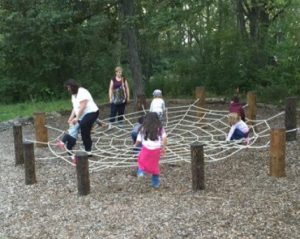 On Saturday I walked out on a warm Midwest night into one of the most peaceful neighborhoods you could imagine. The community was fenced in with many kids playing outside under the watchful eyes of their parents and grandparents. The night would have been serene if it wasn’t for the constant noise of the cicadas coming from all around. For those of you who don’t know, cicadas are a giant grasshopper-like insect which hatches every 2 – 17 years and after hatching immediately begins “singing” (which really just sounds like a harsh insect noise) to find a mate. The song is loud, constant, and everywhere but hey, I can’t say it’s the most ridiculous thing I have ever seen done to get a mate.
On Saturday I walked out on a warm Midwest night into one of the most peaceful neighborhoods you could imagine. The community was fenced in with many kids playing outside under the watchful eyes of their parents and grandparents. The night would have been serene if it wasn’t for the constant noise of the cicadas coming from all around. For those of you who don’t know, cicadas are a giant grasshopper-like insect which hatches every 2 – 17 years and after hatching immediately begins “singing” (which really just sounds like a harsh insect noise) to find a mate. The song is loud, constant, and everywhere but hey, I can’t say it’s the most ridiculous thing I have ever seen done to get a mate.
While this scene is common place in the suburbs of the Midwest, I think it represents a much more serious spiritual reality. At the conference in Lenexa Josh spoke about what he calls The Perfect storm which involves the multifaceted pressure coming against the church due to changes in our culture. This Perfect Storm is comprised of a massive media glut hitting our children combined with the increased access children have to internet pornography. While increased access to media and information is not a bad thing, it has caused today’s children to have a million and one voices giving them information in competition with the values they learn at home and at church. Just as the noise of the cicadas was all around, the internet has spread the noise of information and contrary views spread everywhere. In the midst of this media noise pornography has found ways to access children at earlier and earlier ages. Today the average age for a child’s first exposure to pornography is eight years old1.
At the conference in Lenexa Josh spoke about what he calls The Perfect storm which involves the multifaceted pressure coming against the church due to changes in our culture. This Perfect Storm is comprised of a massive media glut hitting our children combined with the increased access children have to internet pornography. While increased access to media and information is not a bad thing, it has caused today’s children to have a million and one voices giving them information in competition with the values they learn at home and at church. Just as the noise of the cicadas was all around, the internet has spread the noise of information and contrary views spread everywhere. In the midst of this media noise pornography has found ways to access children at earlier and earlier ages. Today the average age for a child’s first exposure to pornography is eight years old1.
These forces have created many discouraging statistics 80 percent of 15 – 17 year olds have had multiple exposures to pornography, and 69 percent of young people are leaving the church after high school.2  It appears as though fighting to keep out negative cultural influences has become as futile as trying to rid a neighborhood of the noise of cicadas. How do we deal with this problem? I believe the answer is found in the small neighborhood I visited in Lenexa, Kansas. You see, many who would walk by this simple suburb would see nothing special in it. But to me, it is the most special thing — functional families with involved mothers and fathers providing a positive environment for their kids to grow.
It appears as though fighting to keep out negative cultural influences has become as futile as trying to rid a neighborhood of the noise of cicadas. How do we deal with this problem? I believe the answer is found in the small neighborhood I visited in Lenexa, Kansas. You see, many who would walk by this simple suburb would see nothing special in it. But to me, it is the most special thing — functional families with involved mothers and fathers providing a positive environment for their kids to grow. 
While the stats are daunting concerning the problems we face, the stats are likewise extremely clear on the amazing impact parents can have even in the midst of the noise of culture. For example, children raised in a two-parent home who had a good-to- excellent relationship with their father are less than 6 percent likely to use drugs, alcohol or to be violent.3 This influence even extends to areas such as sex and pornography. A Montreal study showed that 45 percent of teens would identify their parents (not their friends or celebrities) as their sexual role models.4 This finding led Professor Jean-Yves Frappier of the University of Montreal to conclude that Parents are the “most important role models for teens.”3 Why is a relationship with parents so important? It is not because it silences the voices of culture (cicadas can still get into neighborhoods). It is important because it can give children an example of true righteousness to contrast against the false ideologies of the world and a loving adult to go to with questions when they encounter pornography and other influences too hard for them to deal with on their own.
With that being said, here is my challenge for those of you who are reading this article. Don’t let the lesson I learned at Lenexa go to waste.If you are a parent/grandparent, get the resources you need and spend the time necessary to develop a loving relationship with your child. While developing your relationship will be one of your life’s most difficult tasks; it will also be one of your life’s most important tasks because your relationship with your child will make a huge difference in their lives (even if they appear unaffected by your influence at times). If you are not a parent, I would challenge you to take the time to recognize those who are parenting well. Perhaps one of the reasons strong families are on the decline in this country is our culture’s lack of appreciation for their crucial role in society. Think about it, today women who choose to put their careers on hold to focus on their kids are viewed as selling out, and men are increasingly judged by their ability to provide for their families rather than their ability to love their children. So take the time to reverse that tide. Send your appreciation to someone who is parenting well. If that seems like an awkward thing for you to bring up in conversation, then simply post this article to their social media page and tell them it made you think of them and the positive impact they have by being a good parent.
I would challenge you to take the time to recognize those who are parenting well. Perhaps one of the reasons strong families are on the decline in this country is our culture’s lack of appreciation for their crucial role in society. Think about it, today women who choose to put their careers on hold to focus on their kids are viewed as selling out, and men are increasingly judged by their ability to provide for their families rather than their ability to love their children. So take the time to reverse that tide. Send your appreciation to someone who is parenting well. If that seems like an awkward thing for you to bring up in conversation, then simply post this article to their social media page and tell them it made you think of them and the positive impact they have by being a good parent.
For FREE resources on relationships and parenting visit our website’s resource tab: /resources/
References:
- Alexa research, NRC, PBS, WordTracker, Google, and MSNBC, Estherministries.org, 2002 Rob Jackson, “How to Confront Children Using Pornography,” Pure Intimacy.org, 2004, https://www.pureintimacy.org/piArticles/A000000593.cfm) www.Familysafemedia.com/pornography_statistics.html
- “Current Pornography Statistics- A Brief Internet Review, 7/29/03,” https://www.familysafemedia.com/pornography_statistics.html
- McDowell, Josh. The Last Christian Generation. Green Key Books (Holiday: Florida. 2006), 13
- Referring to Study: Back to School 1999 – National Survey of American Attitudes on Substance Abuse V: Teens and Their Parents, Conducted by The Luntz Research Companies and QEV Analytics, August 1999.
- Rochman, Bonnie “Who are Teen’s Sexual Role Models? Turns Out, It’s their Parents.” Time Magazine “https://healthland.time.com/2011/07/18/surprise-teens-consider-parents-their-sexual-role-models/#disgus_thread



